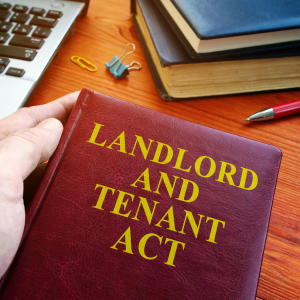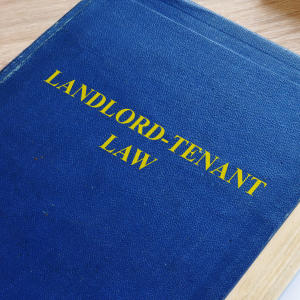
Understanding Ohio Landlord-Tenant Laws for Selling Property
To ensure the smooth sale of a house with tenants, landlords and real estate investors in Ohio need to know everything about the state’s landlord-tenant laws. These laws spell out both parties’ rights and duties, including notice rules and tenant protections during the sale process.
In Ohio, landlords usually have to give tenants enough notice before showing the property to someone else or changing who owns it. It is very important to know if your lease is month-to-month or fixed-term, as this will affect what you have to do legally to let the tenant know when the lease ends.
Also, landlords must respect the tenant’s right to enjoy their property in peace, and they can’t invade their privacy by entering the property without giving them enough notice. Following these rules not only helps you maintain a good relationship with your tenants but also lowers the chance of getting into a legal battle over how you dealt with tenants during the sale.
Knowing the laws in each state helps real estate investors deal with the difficulties of selling a property that already has tenants while protecting their investment and staying legal throughout the process.
Legal Considerations for Selling a Tenant-occupied Home in Ohio
Real estate investors and landlords in Ohio must consider many legal issues when they want to sell a rented home. They must make sure they follow all state and federal laws. It is very important to carefully read the current lease agreement because it spells out the tenant’s rights during the sale process.
Ohio law requires landlords to give tenants enough notice about showings and possible changes in ownership. Landlords must also follow any lease rules about access to the property and give potential buyers enough time to inspect or view it.
Landlords should also know about the federal Protecting Tenants at Foreclosure Act if it applies to their properties because it may change how tenants are treated after the sale. It is also important to know the ins and outs of transferring security deposits and to make sure you are following the rules in your area.
Talking to a real estate lawyer who knows Ohio landlord-tenant law can help you avoid problems, ensure the sale goes smoothly, and protect the tenants’ rights.
Preparing Your Rental Property for Sale in the Ohio Real Estate Market
When getting your rental property ready to sell in Ohio, it’s important to ensure it’s in great shape so buyers will be interested. Start by carefully checking the property for any repairs or maintenance issues, like leaking faucets, broken wiring, or damaged flooring.
It’s also important to make the outside of your home look better. For a good first impression, think about adding new plants or paint. If your house is still rented out, be honest with the tenants about the selling process and schedule showings at times that don’t interfere with their daily lives too much.
Tenants may be more willing to cooperate if you offer them incentives like lower rent during this time. Also, get all the necessary paperwork, such as rental agreements, records of rental income, and property taxes, so you can give clear information to people who are interested in investing.
In Ohio’s competitive housing market, pointing out the property’s profitability as a rental asset can help bring in real estate investors who want an easy way to turn their property into an income-generating asset.
Communicating with Tenants About Selling Your House in Ohio

If you rent a house in Ohio and want to sell it, you must be able to talk to the tenants clearly. First, let them know ahead of time that you want to sell. This lets them know you value them and gives them time to make necessary changes.
Go over each step of the process, from listing the house to possible showings, to make it clear. By law in Ohio, landlords must give a reasonable amount of time before showings happen. This is usually 24 hours. To keep things clear, make sure this is communicated clearly.
Talking to your tenants can help you build trust and get them to work with you while you sell your house. Make sure they know what their rights are and that their lease will be honored during the sale.
Taking care of tenant complaints quickly and professionally can help them feel better and build a good relationship with you, which is good for everyone in the sale of your rental property in Ohio.
Strategies for Marketing Tenant-occupied Properties in Ohio
Rental property owners and real estate investors in Ohio who want to sell a home should focus on strategies that show off the home’s value and address any concerns that buyers might have. When you buy a house that already has tenants, you can start making money right away from rent, and the tenants have been living there for a while, so you know they will stay.
People who want to buy can feel better about having a steady cash flow by checking out how reliable the current tenants are and how well they pay their rent. That being said, it’s also important to be clear about the terms of the lease, like how much the rent is and when it ends.
Professional pictures of the inside and outside of the house can attract more interest, but it’s important to respect the tenant’s privacy when the house is being shown. Hire a real estate agent with experience who knows how the Ohio market works. They will help you target the right kinds of buyers, which will improve your marketing.
Negotiating a Home Sale with Current Tenants in Place in Ohio
Renters and real estate investors in Ohio who want to sell a house that already has tenants must carefully weigh the needs of potential buyers against the rights of their tenants. You need to know Ohio’s tenant laws to make sure the deal goes smoothly and to keep good relationships with the tenants.
As soon as you decide to sell, you should let your tenants know. You should also talk about how showings will be handled so that there is as little trouble as possible. If you offer tenants incentives like lower rent or help with moving, they might be more willing to work with you during the selling process.
People may also be interested if you discuss the property’s potential as an investment with rental income. Things can go wrong, but working closely with an Ohio real estate agent who knows a lot about rental properties can help you fix them.
By encouraging open communication and collaboration, you can make the sale go more smoothly while protecting the tenants’ rights.
Managing Lease Agreements When Listing a Rental Property for Sale in Ohio
Are you a landlord or an investor in Ohio who wants to rent out a house? If so, you should know how to handle lease agreements. Reading the current lease is important to know what each person is in charge of and their rights.
It’s important to be clear that Ohio renters have the right to enough notice before a house is sold. Those who rent out homes should be told about any showings or inspections. Renters will have little trouble going about their daily lives, and landlords will follow the terms of the lease.
If the lease has a “sale clause,” the person who buys the house may be able to get out of the lease early. If the lease doesn’t have a sale clause, the new owner has to keep it until the end. People who want to start renting right away might be interested in investors who are selling with a lease still in place. However, investors should also consider whether a buyout deal with the tenant could make the sale go more smoothly.
Know these things before you try to sell a rental property in Ohio. They will help keep everyone safe and make the process go more smoothly. Contact Blad Boys Buy Homes for expert guidance every step of the way.
Financial Implications of Selling a Rented House in the State of Ohio
People in Ohio who rent out their homes or invest in real estate should consider how selling a rented home will affect their money. The value of the house might go down, which is one of the concerns. Some people might not want to buy homes that already have tenants, which could cause the price to drop because fewer people want to buy them.
Listings in Ohio must follow the laws that cover landlords and renters. Because of these laws, the sale might not happen when or how planned. To follow the law, landlords often have to give potential renters a right of first refusal or talk about ending the lease early, which could cost money or bring in less rental income.
People who invest in Ohio rental homes should also know what taxes they might have to pay when they sell the homes. Income taxes and depreciation recapture could be part of the equation. Understanding these financial factors is key if you want to get the most money when you sell your Ohio rental house. If you’re looking to simplify the process, you can sell your home for cash in Ohio to avoid delays and reduce closing complications.
How to Handle Security Deposits When Selling an Occupied Home in Ohio
Landlords and real estate investors in Ohio who want to sell a house with renters already living in it need to be careful with security deposits so the deal goes smoothly. Ohio law says that when a house is sold, the landlord has to give the new owner any security deposit they have on file.
This transfer should be done with care so there are no problems between the seller, the buyer, or the tenants. If Ohio law allows it, the landlord has to give a full breakdown of each tenant’s security deposit at the end of the lease. This includes any interest that has grown on the deposit.
You can also help keep the sale honest and open by telling the tenants about their rights and how the moving process works. As a landlord, you should read the lease and make sure you understand any rules about security deposits. To ensure they follow the rules when they market their home, they should also talk to lawyers or real estate agents who know Ohio’s property laws.
This way, everyone will be kept safe, and the change will be as easy as possible for both the new owner and the people who are already living there.
Inspecting and Appraising Tenant-Occupied Properties for Sale in Ohio

When someone in Ohio who owns rental property wants to sell it, they must first do a full inspection and appraisal. A thorough property inspection can help you find repairs or maintenance issues that could make a home less valuable on the market.
If you want to keep your tenants happy and follow Ohio’s rules on notice, you should tell them when inspections are coming up. A good appraisal will look at how much rent the house could bring in as one of its main tasks. This is very important for rental homes that are already rented out.
Appraisers will consider the property’s location, any current lease agreements, and the state of Ohio’s real estate market as a whole. They will also consider sales like this that have happened in the area. Lenders should gather all the necessary paperwork, like rent rolls and lease agreements, so that people who want to invest can get a full picture of the opportunity.
Paying attention to these things during inspections and appraisals can make it more likely that your rental properties will do well. The real estate market in Ohio is very competitive.
Common Challenges and Solutions When Selling a Tenant-occupied House
Landlords and real estate investors may encounter some issues when trying to sell an Ohio rental home. The process can go more smoothly if you know about these issues and how to fix them. Setting up showings while still being aware of the tenant’s rights and privacy is a common issue. This might be hard, but it’s possible if everyone talks to each other clearly and maybe even gets something for working together.
It is very important to follow Ohio’s landlord-tenant laws. If you don’t give enough notice or follow the terms of your lease, you could get in trouble with the law. If you want to avoid making buyers feel bad during inspections, which could make them decide not to make an offer, you should fix any maintenance issues as soon as possible.
Keep the lines of communication open with the tenants during the sale negotiations. It’s common to talk about things like buying out the lease or getting help with moving. When setting the price of the home, it’s important to keep in mind that it’s rented out, since some buyers may not want to take on tenants.
Working with a real estate expert with experience in rental properties can help you get through these tough situations. Blad Boys Buy Homes can help with insights into market trends and effective negotiation strategies for rental properties.
Closing the Deal: Final Steps to Sell Your Occupied Home Legally and Smoothly
In Ohio, it’s important to follow the rules and communicate well with everyone involved when you want to close on a house that is currently rented out. As a first step, landlords and real estate investors in Ohio need to make sure they are following the state’s tenant laws. These laws say landlords must give tenants enough notice and keep their end of any lease agreements.
If you want to stay out of trouble with the law, you should only work with real estate agents and lawyers who know how to sell homes that are still being lived in. Being honest with buyers is important. Tell them about the current lease, the history of the tenants, and any debts they will take on.
By checking the house carefully and fixing anything that needs fixing, you can help avoid problems at the last minute that could slow down the sale. Working with title companies that know Ohio’s rules ensures that all the paperwork is done correctly. This makes the transfer of ownership go smoothly and helps you keep good relationships with tenants while the closing is going on.
Impact of Rent Control Policies on Selling Houses with Tenants in Major Ohio Cities
Rent control laws in big Ohio cities can make it very hard to sell a house that is currently rented out. Landlords and real estate investors need to know these rules to navigate the property market successfully.
Laws that control rent are meant to keep rent increases to a minimum. This keeps rent stable for tenants but could make it harder for property owners to sell their homes. In cities like Cleveland and Cincinnati, where rent control laws may already be in place or are being thought about, sellers need to think about how these laws will affect the value of their homes and the interests of buyers.
People who want to buy homes might be hesitant to do so if the rental income is limited. This could make it take longer to sell or get lower offers. Also, existing lease agreements that are controlled by rent control can make it hard to evict tenants or change the terms of the lease, so sellers need to do a lot of research.
Landlords should consult legal professionals who know Ohio’s rent control laws to ensure they are following the rules, making the most of their sales strategy, and keeping good relationships with their tenants during the transition.
Alternatives to Traditional Sales: Exploring Options Like Cash Buyers or Auctions
Landlords and real estate investors in Ohio have a number of options other than the traditional sales process to sell a house that is rented out. These options can speed up the process and increase returns. People often choose to sell their homes to cash buyers, who can close quickly and don’t need mortgage approvals, which makes the sale go more quickly and with less trouble.
People who pay cash are usually investors looking for rental properties or chances to fix up and sell them, so they might be more willing to buy a home that already has tenants. You could also put the property up for auction, which can bring in competitive bids and possibly higher sale prices in a short amount of time.
Auctions attract serious buyers who are ready to make a purchase. They are also a quick and easy way to sell something without putting it on the market for a long time. Both options can be much better than traditional ones because they can reduce the time a property is on the market and make it easier to work out lease agreements in Ohio’s real estate market.
Preparing Tenants for Showings and Open Houses While Maintaining Privacy
When selling a tenant-occupied house in Ohio, landlords and real estate investors must effectively prepare tenants for showings and open houses while respecting their privacy. Start by communicating clearly with tenants about the sales process and providing ample notice before any scheduled showings, as required by Ohio law.
It’s important to foster cooperation by explaining the benefits of showcasing the property well, such as potentially finding a buyer who will continue renting to them. Address tenant concerns about privacy by ensuring that personal belongings are respected and secure during visits.
Consider offering incentives, like rent reductions or gift cards, to encourage tenants to keep the property clean and presentable. Scheduling showings at convenient times can minimize disruptions and maintain goodwill.
By balancing transparency with respect for tenant privacy, landlords can facilitate smoother transactions that satisfy both tenant needs and home-selling objectives. Working with a company that buys homes in Bellbrook, OH, and nearby areas can make this process even easier by streamlining the sale and minimizing disruptions for tenants.
Can My Landlord Sell the House I’m Renting in Ohio?
In Ohio, landlords have the legal right to sell a tenant-occupied house even while it is under lease. As a tenant, you may wonder how this affects your rights and what steps you should take.
It’s important to understand that the sale does not terminate your existing lease agreement; the new owner must honor the terms of any active rental agreement. Landlords looking to sell a property with tenants should communicate openly with their renters about the process and timeline.
Real estate investors interested in purchasing tenant-occupied properties should conduct thorough due diligence, review current leases, understand tenant rights, and consider potential impacts on investment returns. For both landlords and real estate investors in Ohio, navigating the sale of a tenant-occupied house requires careful planning and adherence to state laws governing landlord-tenant relationships.
By ensuring all parties are informed and respecting tenant rights, landlords can facilitate a smoother transaction while maintaining positive relations with tenants during the transition.
Can a Tenant Refuse Viewings in Ohio?
In Ohio, landlords and real estate investors who are selling a tenant-occupied house must navigate certain legalities regarding tenant rights. One common question is whether a tenant can refuse viewings.
Under Ohio law, tenants have the right to “quiet enjoyment” of their rental property, which means they can expect reasonable privacy and peace without excessive disturbances. Although landlords have the right to show the property to prospective buyers, they must provide proper notice to the tenants before scheduling any viewings.
Typically, this involves giving at least 24 hours’ notice unless otherwise specified in the lease agreement. However, if a tenant feels that frequent or poorly timed viewings infringe upon their privacy or violate lease terms, they may have grounds to refuse access temporarily or negotiate more suitable arrangements.
Landlords and real estate investors must communicate clearly with their tenants about showing schedules and respect their rights under Ohio’s landlord-tenant laws to ensure a smooth sale process. Understanding these legal obligations not only helps maintain good landlord-tenant relations but also ensures compliance with Ohio state regulations when selling an occupied property.
Can a Landlord Break a Lease to Sell the Property in Ohio?

In Ohio, landlords often face questions about whether they can break a lease to sell a tenant-occupied property. Generally, Ohio landlord-tenant laws prioritize the tenant’s rights and the terms outlined in the existing lease agreement.
A landlord cannot unilaterally terminate a lease simply because they wish to sell the property. However, there are ways to navigate this situation legally and amicably.
Landlords should review the lease agreement for any clauses that might allow for early termination under specific circumstances, such as selling the property. If no such clause exists, landlords may consider negotiating with tenants to reach a mutually beneficial agreement, potentially offering incentives for early lease termination or relocation assistance.
It’s crucial for landlords and real estate investors in Ohio to understand that any forceful attempt to evict a tenant without proper legal grounds could lead to potential legal disputes or penalties. Engaging in open communication with tenants and seeking advice from real estate professionals or legal counsel can help ensure that the process of selling a tenant-occupied house adheres to Ohio’s regulations while respecting tenant rights.
Can My Landlord Do Showings While I Still Live There?
A lot of landlords and real estate investors in Ohio want to sell homes that have renters living in them. If the tenants are still living there, they want to know if the house can be shown to people who want to buy it. To protect the renters’ rights, Ohio renters can show potential buyers around their homes, but they have to follow certain rules.
Usually, the landlord must give the tenant at least 24 hours’ notice before the showing. This way, the renter will know about the show and have time to get ready. Because of this rule, it’s important to keep in touch with tenants and get along with them while the house is being sold.
Renters should also be able to choose when the showings happen, and landlords should offer gifts or lower rent to incentivize people to help. If you want to sell a rental property in Ohio, here’s what you need to know about the law and how to get along with tenants.
Ready to sell your home? Blad Boys Buy Homes makes it easy with fair cash offers, no repairs needed, and full support. We handle the paperwork and help you navigate insurance before and after the sale. Call (937) 404-6614 for a no-obligation offer and a stress-free experience.
| RENTAL HOME | TENANCIES | CLEVELAND, OH | CLEVELAND, OHIO | CLEVELAND OHIO | MARKET PRICE |
| PAYMENTS | NOTICE TO VACATE | EVICTED | OHIO REVISED CODE | CLEANLINESS | |
| LEGAL BATTLE | LITIGATION | LAWSUITS | COURT | LEGALLY BINDING | CONTRACT |
| RISK | LEGAL ADVICE | BLOG | REAL ESTATE TRANSACTION | POLICY | HOMEOWNERS |
| LOCAL ORDINANCES | FAIR HOUSING | THE REAL ESTATE | RENTAL PROPERTY WITH | TENANTS IN OHIO | SELLING RENTAL PROPERTY |
| AS A LANDLORD | IF THE TENANT | THE REAL ESTATE MARKET | RENTAL PROPERTY WITH TENANTS | PROPERTY WITH TENANTS IN | HOUSE FAST FOR CASH |
Useful Ohio Blog Articles
- Selling Your Ohio Home By Owner
- Selling A Foreclosed Home In Ohio
- How To File A Quitclaim Deed In Ohio
- Selling A Tenant-Occupied House In Ohio
- Appraisal Required Repairs In Ohio Real Estate
- Selling a Home That Needs Repairs in Ohio
- Sell a House With a Mortgage in Ohio
- Sell a House While Relocating in Ohio
- Paperwork for Selling a House by Owner in Ohio
- How to Sell an Inherited House in Ohio

![We Buy Houses in [market_city]](https://image-cdn.carrot.com/uploads/sites/80441/2024/11/We-Buy-Houses-1200x800.png)
